[vc_row][vc_column][vc_column_text]If you or someone you know is the kind of person who calls winter “reading season,” this list is for you.
If you or someone you know is the kind of person who handles a wrapped gift and bursts with excitement when it becomes evident that, “Ooh! It’s a book!” this is the kind of article you should casually leave open on your screen as an–ah-hem!–hint to your family members in case they happen to be hunting for gift ideas.
At Sightline, we’re readers. Books are our friends. And without further ado, these are some of our favorite reads this year, from novels, sci-fi, nonfiction, poetry, and more. If you have a book you loved best this year, leave the title and author in the comments section below.[/vc_column_text][/vc_column][vc_column width=”1/4″][vc_column_text]
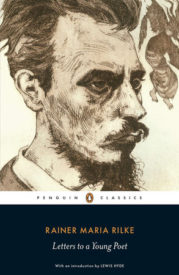
[/vc_column_text][/vc_column][vc_column width=”3/4″][vc_column_text]
Eric De Place, Programs director
[/vc_column_text][vc_column_text]
Letters to a Young Poet by Rainier Maria Rilke
The best book I read this year was an old one: Rilke’s book, based on a correspondence he carried out between 1902 and 1908. The letters work as meditations on many subjects: the life of the mind, professional struggle, loneliness, and learning how to swim against the current of conventional wisdom. It’s good fare for the Northwest’s long winter nights.[/vc_column_text][/vc_column][/vc_row][vc_row][vc_column][vc_column_text]
[/vc_column_text][vc_separator][vc_column_text]
Alan Durning, Executive Director
[/vc_column_text][vc_column_text]
This year, when liberal democracy is under siege near and far, I have been reading about totalitarianism of both the left and the right. I recommend two books by the same author, historian Adam Hochschild.
Spain In Our Hearts: Americans in the Spanish Civil War, 1936-1939
This first book details the epochal left-right showdown on the Iberian peninsula in the years leading up to World War II. It was a dress rehearsal for that great war: Adolf Hitler and Benito Mussolini armed and sent troops to the Spanish generals, ultimately led by General Francisco Franco, who sought to overthrow the elected government. The West dithered endlessly, and only the Soviet Union helped the Spanish government. Hochschild casts light on the massive, organized brutality that marked the birth of the Franco dictatorship, but he also illuminates the purges that decimated the Spanish Left during the civil war—murders and disappearances ordered not only by the Right but by Communists who took directions from Moscow. In this conflict, American (and Canadian) combatants were idealistic, zealous, and sometimes credulous volunteers. To their credit, they went to fight the fascists when Western governments refused to do so. Had France, the United Kingdom, and the United States supported the government and its troops—or even just cut off oil shipments to Franco from the United States—Franco might never have risen to power. Indeed, Spain might have fought with the Allies in World War II. To the volunteers’ discredit, too many turned a blind eye to the cancerous barbarism that Soviet Communism had already become.
The Unquiet Ghost: Russians Remember Stalin
The second book documents the purges that killed perhaps 20 million people in the first few decades of the Soviet Union. Two things linger with me from this sobering book: the scale of the genocide (exceeding even the Nazi Holocaust in its macabre toll) and the way that psychopathy came dressed in the political ideology of equality and liberation. The pervasiveness of denunciations, purity testing, and thought policing made Joseph Stalin’s death camps an especially potent reminder that tolerance for dissent, whether from the cant of the Left or the Right, is among the indispensable virtues of any civilization. A good reminder in a time of deep divisions in the United States.
OK, that’s kind of a downer. So here’s a bonus book: something more uplifting. Hochschild also wrote my favorite history ever. Bury The Chains chronicles the implausible victory of the British anti-slavery movement. It’s a profile of dissenters who changed the world. Inspiring and a happy ending!
[/vc_column_text][vc_row_inner][vc_column_inner width=”1/3″][vc_column_text]
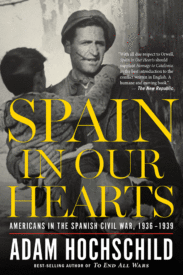
[/vc_column_text][/vc_column_inner][vc_column_inner width=”1/3″][vc_column_text]
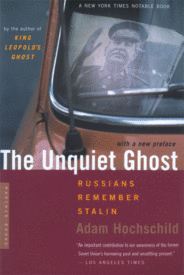
[/vc_column_text][/vc_column_inner][vc_column_inner width=”1/3″][vc_column_text]
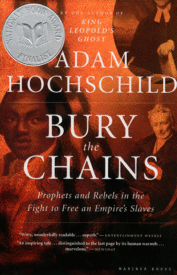
[/vc_column_text][/vc_column_inner][/vc_row_inner][/vc_column][/vc_row][vc_row][vc_column][vc_column_text]
[/vc_column_text][vc_separator][vc_column_text]
Kristin Eberhard, Senior researcher
[/vc_column_text][/vc_column][vc_column width=”1/4″][vc_column_text]
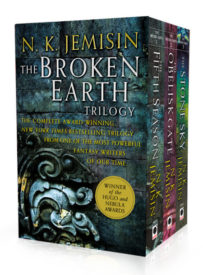
[/vc_column_text][/vc_column][vc_column width=”3/4″][vc_column_text]
The Broken Earth Trilogy
I loved N.K. Jemisin’s Broken Earth Trilogy: The Fifth Season, The Obelisk Gate, and The Stone Sky. All three books won the prestigious science-fiction Hugo Award, as they should have. This is an epic story of almost-magic, what it means to be human, to be part of a family, to love, set in a world that we can easily imagine could be our own. The protagonist is a middle-aged woman and the author is an African-American woman who weaves themes of race and womanhood seamlessly throughout.
[/vc_column_text][/vc_column][/vc_row][vc_row][vc_column width=”1/4″][vc_column_text]
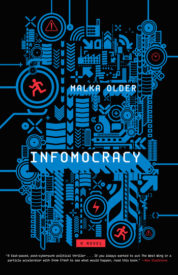
[/vc_column_text][/vc_column][vc_column width=”3/4″][vc_column_text]
Infomocracy by Malka Older
A sci-fi book about an idealistic crusader fighting to keep a new-fangled democracy reform… is it possible Older wrote this book specifically for me? Thank you, I loved it.
[/vc_column_text][/vc_column][/vc_row][vc_row][vc_column width=”1/4″][vc_column_text]
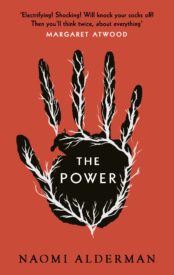
[/vc_column_text][/vc_column][vc_column width=”3/4″][vc_column_text]
The Power by Naomi Alderman
Naomi Alderman, a protégé of Margaret Atwood, knocks it out of the park with this piece of feminist science fiction. It is a short, breezy read, but packs a punch about how power changes us, and what people do when they have it.
[/vc_column_text][/vc_column][/vc_row][vc_row][vc_column][vc_column_text]
[/vc_column_text][vc_separator][/vc_column][vc_column width=”1/4″][vc_column_text]
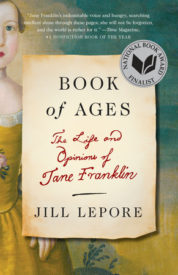
[/vc_column_text][vc_column_text]
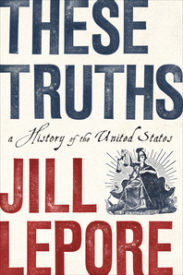
[/vc_column_text][/vc_column][vc_column width=”3/4″][vc_column_text]
Anna Fahey, Director of strategic communication
[/vc_column_text][vc_column_text]
Jill Lepore
I adore Jill Lepore. Over the years, I have devoured her writing in The New Yorker on American history, law, literature, and politics, but only recently tucked into her books. I started with her clever recasting of America’s founding decades via a charming portrait of Benjamin Franklin’s youngest sister, Book of Ages: The Life and Opinions of Jane Franklin. Lepore’s alternative vantage on well-worn stories and historical figures was so refreshing, I’m now making my way through her latest, These Truths, a comprehensive history of the American experiment that through obscure archival documents gives voice to forgotten characters and reexamines everything from Age of Discovery to present-day manipulations of our founding myths (by Bernie Sanders and Donald Trump alike) through a feminist and social justice lens. Plus, the prose is stunning. Lepore’s language has a poetic rhythm and depth that almost makes you forget you’re struggling to keep a 4.5-pound history text propped in your lap.
[/vc_column_text][/vc_column][/vc_row][vc_row][vc_column width=”1/4″][vc_column_text]
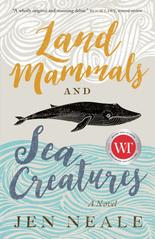
[/vc_column_text][/vc_column][vc_column width=”3/4″][vc_column_text]
Land Mammals and Sea Creatures by Jen Neale
As Pacific Northwest rains set in this fall, I also enjoyed curling up with British Columbian Jen Neale’s debut novel. I found the surprise of the book’s “magical realism” well balanced with the comforting familiarity of the characters and the Cascadian places Neale lovingly captures.[/vc_column_text][/vc_column][/vc_row][vc_row][vc_column][vc_column_text]
[/vc_column_text][vc_separator][vc_column_text]
Aven Frey, Development associate
[/vc_column_text][/vc_column][/vc_row][vc_row][vc_column width=”1/4″][vc_column_text]
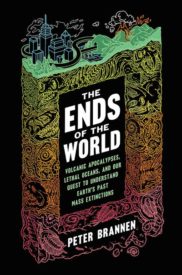
[/vc_column_text][/vc_column][vc_column width=”3/4″][vc_column_text]
The Ends of the World: Volcanic Apocalypses, Lethal Oceans, and Our Quest to Understand Earth’s Past Mass Extinctions by Peter Brannan
It may be kind of perverse, but in these times of great climate uncertainty, I’ve actually found comfort in reading Peter Brannen’s book. Going over each of the last five mass extinction events in Earth’s history, the author discusses the plants and creatures that existed during each epoch, the fossil record of their disappearances, and the current scientific evidence that exists for the cause of each event. Spoiler alert: climate change has played a major role, each and every time our biosphere has experienced a massive species die-off. How is this comforting? Well, so far biodiversity has come back quite spectacularly after even the most thorough annihilation, so it’s reassuring to know the planet will bounce back after we’re done self-destructing.
[/vc_column_text][/vc_column][/vc_row][vc_row][vc_column][vc_column_text]
For Kids
Top marks in kids’ books this year go to Maddi’s Fridge, about kids dealing with food insecurity, and A Day in the Life of Marlon Bundo, about the BOTUS (bunny of the United States).
Maddi’s Fridge, written by Seattle teacher and author Lois Brandt, teaches kids about what happens when a family doesn’t have enough money to buy food, and how we can all help out so that no kid has to go to bed hungry.
If you haven’t yet heard about Marlon Bundo, presented by John Oliver of Last Week Tonight fame, you should go buy a copy right now, whether you have kids in your life or not. For one, all proceeds benefit The Trevor Project and AIDS United, and for another, how can you resist a story about Mike Pence’s gay pet bunny finding his true love and leading an insurrection against an intolerant (and suspiciously familiar-looking) stink bug who says being different is bad?
For those that do have young kids in their lives, I highly recommend The Importance of being Little: What Young Children Really Need From Grownups, by former Yale researcher Erika Christakis.[/vc_column_text][vc_row_inner][vc_column_inner width=”1/3″][vc_column_text]
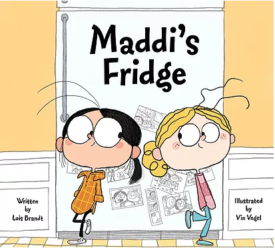
[/vc_column_text][/vc_column_inner][vc_column_inner width=”1/3″][vc_column_text]
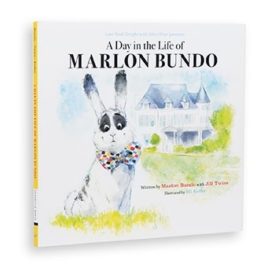
[/vc_column_text][/vc_column_inner][vc_column_inner width=”1/3″][vc_column_text]
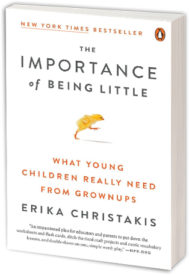
[/vc_column_text][/vc_column_inner][/vc_row_inner][vc_column_text]
[/vc_column_text][vc_separator][/vc_column][/vc_row][vc_row][vc_column][vc_column_text]
Ed Guzman, Senior communications manager
[/vc_column_text][/vc_column][vc_column width=”1/4″][vc_column_text]
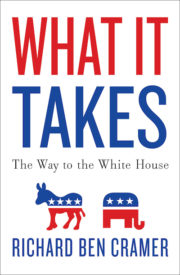
[/vc_column_text][/vc_column][vc_column width=”3/4″][vc_column_text]
What It Takes: The Way to the White House by Richard Ben Cramer
Before a recent work trip, I pulled Cramer’s book off my shelf at home in order to have something to read during quieter moments in Seattle. The book is a sprawling, engrossing account of the 1988 presidential election, with a focus on six candidates—George H.W. Bush, Bob Dole, Gary Hart, Joe Biden, Dick Gephardt, and Michael Dukakis. Before there was Game Change, there was What It Takes, and I would argue Cramer not only did it first, he did it better.
The fact that President Bush died only weeks after I revisited this book is an eerie coincidence. But part of the reason I note it here is because, unlike most US presidents, Bush did not write a memoir. And thus, any penetrating accounts of him in book form are trickier to come by (the Washington Post wrote about this point about a week after he died). So in the wake of renewed interest in Bush’s life, I would recommend Cramer’s book, which captured a snapshot of Bush the Vice President (and the presidential candidate).
[/vc_column_text][/vc_column][/vc_row][vc_row][vc_column][vc_column_text]
[/vc_column_text][vc_separator][vc_column_text]
Kelsey Hamlin, Communications associate
[/vc_column_text][/vc_column][vc_column width=”1/4″][vc_column_text]
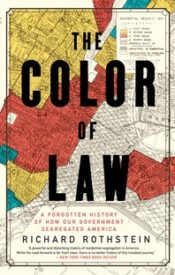
[/vc_column_text][/vc_column][vc_column width=”3/4″][vc_column_text]
The Color of The Law by Richard Rothstein
This is an astounding and straight-forward book about housing segregation, a pretty huge front skipped over by the Civil Rights movement. The US narrative concluded it was all de facto segregation, thanks to private prejudices, but the federal government clearly had racially explicit incentives and programs for public housing. It’s a “yes and” type of situation, but the fact of the matter is the US government wasn’t held accountable for its unconstitutional housing decisions.[/vc_column_text][/vc_column][/vc_row][vc_row][vc_column width=”1/4″][vc_column_text]
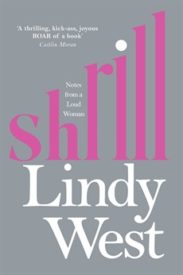
[/vc_column_text][/vc_column][vc_column width=”3/4″][vc_column_text]
Shrill: Notes from a Loud Woman by Lindy West
This book is:
1) By a local author and journalist
2) Hilarious and insanely relatable and
3) Feminist. It’s a quick read but hits so many nails on the head. The book goes through her journey of accepting her own body, the obstacles that prevented her from doing so, and the shared strain of so many women today.[/vc_column_text][/vc_column][/vc_row][vc_row][vc_column width=”1/4″][vc_column_text]
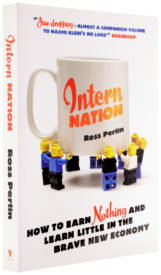
[/vc_column_text][/vc_column][vc_column width=”3/4″][vc_column_text]
Intern Nation: How to Earn Nothing and Learn Little in the Brave New Economy by Ross Perlin
This book starts off a little slow but really picks up the heat after one chapter. It analyzes all of the nuance behind unpaid and underpaid internships, and how they ultimately don’t follow any part of the law under labor standards and yet persist. He details how the system upholds itself through multiple facets. There was clearly a lot of reporting behind this book because he references so many peoples’ real stories but keeps them with pseudonyms, and he references so many bits of the law (like the differences of volunteering standards vs labor standards, individual court cases, and a really weird network of colleges and grants).[/vc_column_text][/vc_column][/vc_row][vc_row][vc_column width=”1/4″][vc_column_text]
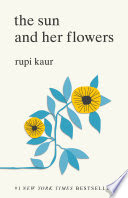
[/vc_column_text][/vc_column][vc_column width=”3/4″][vc_column_text]
Milk and Honey and The Sun and Her Flowers by Rupi Kaur
Admittedly, I do prefer the latter of the two. It’s a bunch of short poems, some of which definitely made me cry. Trigger warning: rape. It’s raw and beautiful and disparaging and uplifting all at the same time.[/vc_column_text][/vc_column][/vc_row][vc_row][vc_column][vc_column_text]
[/vc_column_text][vc_separator][vc_column_text]
Kelsey McComas, Development associate
[/vc_column_text][/vc_column][vc_column width=”1/4″][vc_column_text]
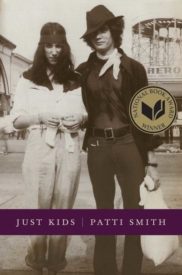
[/vc_column_text][/vc_column][vc_column width=”3/4″][vc_column_text]
Just Kids by Patti Smith
Just Kids by the multi-talented artist/singer/author Patti Smith, chronicles her rise to fame through the New York art scene in the late 60’s and early 70’s. More important, the book is a tribute to her relationship with the late photographer, Robert Mapplethorpe, who pioneered the use of erotic imagery in photography. With brutal honesty and clarity she tells the story of her and Robert’s unique—and definitely unconventional—partnership, from being broke and struggling artists to Robert’s premature death from AIDS in 1989. I finished the novel in tears from the beauty of it all.
[/vc_column_text][/vc_column][/vc_row][vc_row][vc_column width=”1/4″][vc_column_text]
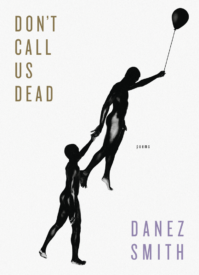
[/vc_column_text][/vc_column][vc_column width=”3/4″][vc_column_text]
Don’t Call Us Dead by Danez Smith
It’s easy to see why this collection was a finalist for the National Book Award in 2017: it begins with a searing (and long!) meditation on police brutality in the US and continues touching on timely topics such as sexuality, race, gun violence, and more. If you want a preview of what’s inside, start with Dinosaurs in the Hood and Dear White America. Their first collection of poetry, [insert] boy, is equally moving.[/vc_column_text][/vc_column][/vc_row]
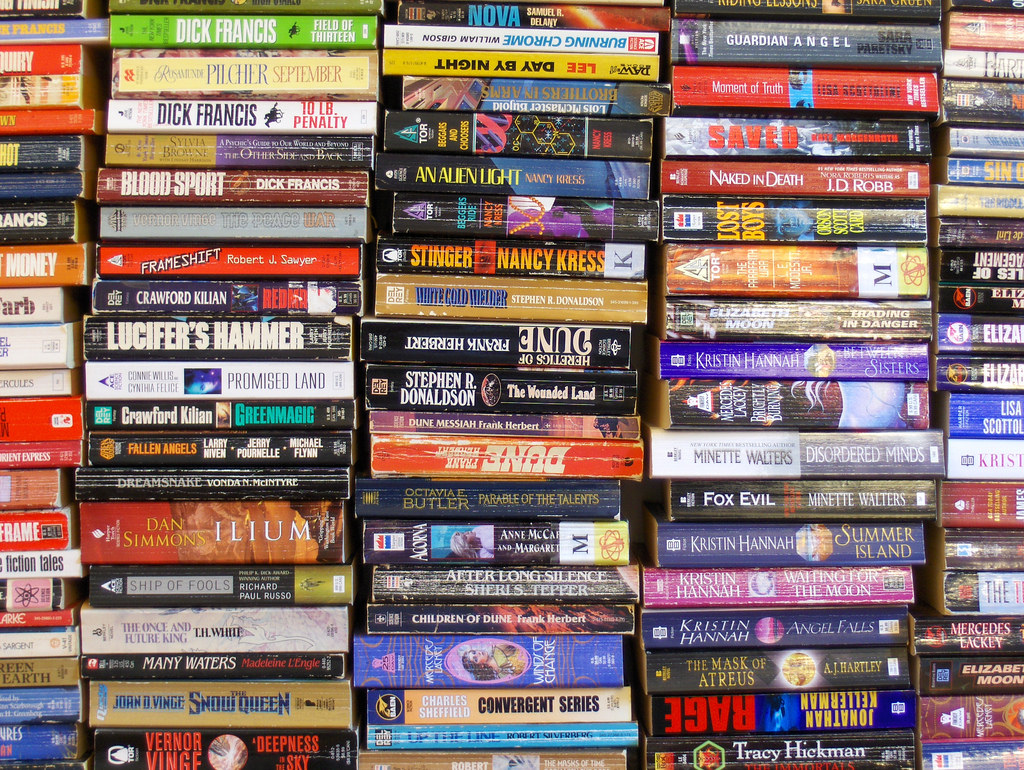

Comments are closed.